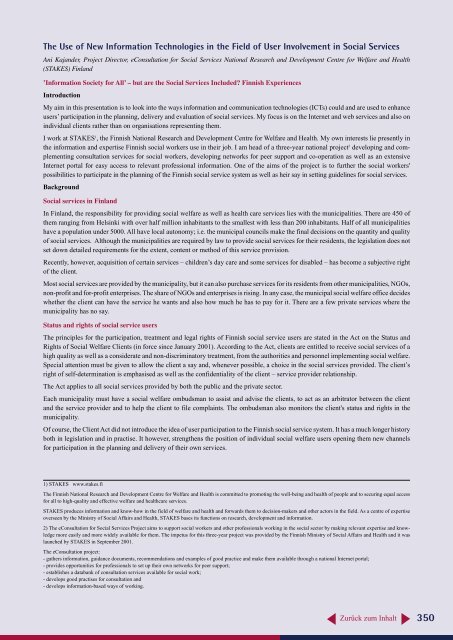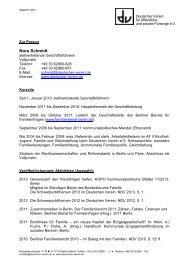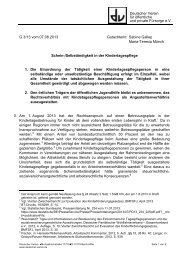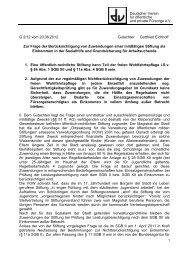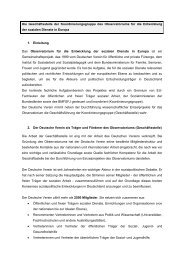Workshop 1.6 - Deutscher Verein für öffentliche und private Fürsorge
Workshop 1.6 - Deutscher Verein für öffentliche und private Fürsorge
Workshop 1.6 - Deutscher Verein für öffentliche und private Fürsorge
Sie wollen auch ein ePaper? Erhöhen Sie die Reichweite Ihrer Titel.
YUMPU macht aus Druck-PDFs automatisch weboptimierte ePaper, die Google liebt.
The Use of New Information Technologies in the Field of User Involvement in Social Services<br />
Ani Kajander, Project Director, eConsultation for Social Services National Research and Development Centre for Welfare and Health<br />
(STAKES) Finland<br />
’Information Society for All’ – but are the Social Services Included? Finnish Experiences<br />
Introduction<br />
My aim in this presentation is to look into the ways information and communication technologies (ICTs) could and are used to enhance<br />
users’ participation in the planning, delivery and evaluation of social services. My focus is on the Internet and web services and also on<br />
individual clients rather than on organisations representing them.<br />
I work at STAKES1 , the Finnish National Research and Development Centre for Welfare and Health. My own interests lie presently in<br />
the information and expertise Finnish social workers use in their job. I am head of a three-year national project2 developing and complementing<br />
consultation services for social workers, developing networks for peer support and co-operation as well as an extensive<br />
Internet portal for easy access to relevant professional information. One of the aims of the project is to further the social workers'<br />
possibilities to participate in the planning of the Finnish social service system as well as heir say in setting guidelines for social services.<br />
Backgro<strong>und</strong><br />
Social services in Finland<br />
In Finland, the responsibility for providing social welfare as well as health care services lies with the municipalities. There are 450 of<br />
them ranging from Helsinki with over half million inhabitants to the smallest with less than 200 inhabitants. Half of all municipalities<br />
have a population <strong>und</strong>er 5000. All have local autonomy; i.e. the municipal councils make the final decisions on the quantity and quality<br />
of social services. Although the municipalities are required by law to provide social services for their residents, the legislation does not<br />
set down detailed requirements for the extent, content or method of this service provision.<br />
Recently, however, acquisition of certain services – children’s day care and some services for disabled – has become a subjective right<br />
of the client.<br />
Most social services are provided by the municipality, but it can also purchase services for its residents from other municipalities, NGOs,<br />
non-profit and for-profit enterprises. The share of NGOs and enterprises is rising. In any case, the municipal social welfare office decides<br />
whether the client can have the service he wants and also how much he has to pay for it. There are a few <strong>private</strong> services where the<br />
municipality has no say.<br />
Status and rights of social service users<br />
The principles for the participation, treatment and legal rights of Finnish social service users are stated in the Act on the Status and<br />
Rights of Social Welfare Clients (in force since January 2001). According to the Act, clients are entitled to receive social services of a<br />
high quality as well as a considerate and non-discriminatory treatment, from the authorities and personnel implementing social welfare.<br />
Special attention must be given to allow the client a say and, whenever possible, a choice in the social services provided. The client’s<br />
right of self-determination is emphasised as well as the confidentiality of the client – service provider relationship.<br />
The Act applies to all social services provided by both the public and the <strong>private</strong> sector.<br />
Each municipality must have a social welfare ombudsman to assist and advise the clients, to act as an arbitrator between the client<br />
and the service provider and to help the client to file complaints. The ombudsman also monitors the client's status and rights in the<br />
municipality.<br />
Of course, the Client Act did not introduce the idea of user participation to the Finnish social service system. It has a much longer history<br />
both in legislation and in practise. It however, strengthens the position of individual social welfare users opening them new channels<br />
for participation in the planning and delivery of their own services.<br />
1) STAKES www.stakes.fi<br />
The Finnish National Research and Development Centre for Welfare and Health is committed to promoting the well-being and health of people and to securing equal access<br />
for all to high-quality and effective welfare and healthcare services.<br />
STAKES produces information and know-how in the field of welfare and health and forwards them to decision-makers and other actors in the field. As a centre of expertise<br />
overseen by the Ministry of Social Affairs and Health, STAKES bases its functions on research, development and information.<br />
2) The eConsultation for Social Services Project aims to support social workers and other professionals working in the social sector by making relevant expertise and knowledge<br />
more easily and more widely available for them. The impetus for this three-year project was provided by the Finnish Ministry of Social Affairs and Health and it was<br />
launched by STAKES in September 2001.<br />
The eConsultation project:<br />
- gathers information, guidance documents, recommendations and examples of good practice and make them available through a national Internet portal;<br />
- provides opportunities for professionals to set up their own networks for peer support;<br />
- establishes a databank of consultation services available for social work;<br />
- develops good practises for consultation and<br />
- develops information-based ways of working.<br />
Zurück zum Inhalt<br />
350


